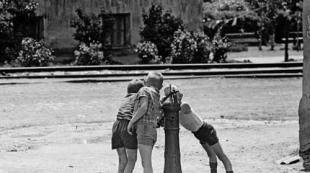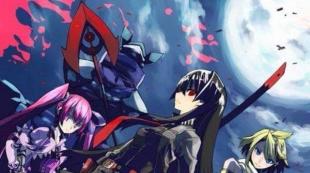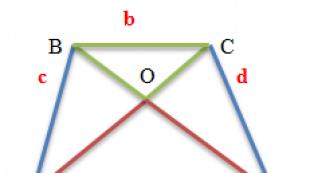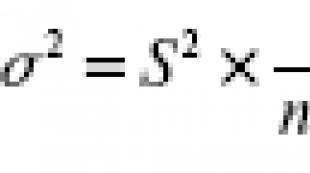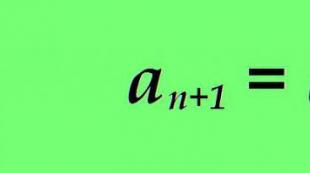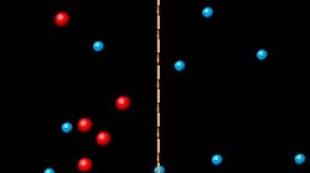Ajax is an ancient Greek hero. The meaning of the word ajax in the reference book of characters and cult objects of Greek mythology
Ajax appears in the Iliad not only as a warrior, but the usual literary form of perception of the Homeric epic presents him to us as a not too clever giant - the second in military prowess after Achilles. At the same time, Ajax constantly leads the flank of the Achaean army, and almost always the Achaeans have success on this flank. Achilles, on the other hand, is glorified for the robberies of small towns in Troad, and is only involved in the big battle in the finale of the Iliad. Ajax carries the body of the deceased Achilles out of the battle and - as his friend and leader in valor - claims his armor. Having lost the lawsuit with Odysseus, Achilles - according to the not very intelligible ancient version - falls into a rage and kills himself by throwing himself on the sword. At the same time, he is not buried on a funeral pyre, but in a sarcophagus (wooden coffin), in an earthen grave - possibly in a tomb that was built during the truce. Usually, in the conditions of a foreign land, the Achaeans use cremation - it is simply impossible to build tombs in a war situation.
Ajax leads a significant part of the Achaean army, having been promoted to commanders during the war. His own detachment fit only 12 ships. There is no information about his Salamis detachment or any associates in the epic. Apparently, the role of Ajax turned out to be much higher than his status at the beginning of the Trojan War.
One of the mysteries of Ajax is his disregard for the chariots used by all the other heroes of the battles of Troy. This puzzle is solved simply: Ajax gains an advantage over the enemy due to an abnormally large shield that cannot be transported by a chariot. Apparently, Ajax also had a powerful physique, and in a standard chariot he could not turn around. In general, a chariot when fighting in a confined space is more of a demonstration of status and a tribute to tradition. Both are unimportant for Ajax, and he simply gets rid of what interferes with his victories in battle.
Ajax's shield was rather not worn, but moved from place to place. But this circumstance is completely in vain to attach to the patronymic of Ajax - Telamonides, which was already interpreted by the ancients as a detail of a shield, its belt sling. The son of the hero Evrysak is quite logically named according to the characteristics that characterize his father - "wide shield" (but also, quite possibly, "eastern shield"). And "telamon" is not only a "sling", but also a "support", "holder". Telamones are male caryatids, Atlanteans. From Greek, this architectural term migrated to Latin.
The Ajax clan comes from the neighboring island of Salamis. Aegina. Aegina is the name of his great-grandmother, whose son Ayaka (Eaka) was considered the son of Zeus. The cult of Ayaka is known along the shores and islands of the Saronic Gulf. The consonance with the name of the great-grandfather for Ajax is not accidental. This is Ayak Jr., similar to his ancestor and named by the same name, but in a deceivingly affectionate sound. The desire to combine two generic names and give it to one bearer can only confuse everything in the world, and this freedom will not solve any problem - neither chronographic nor dynastic. On the contrary, the elimination of Telomon from the genealogy also kills the ancestral history of Achilles. Nevertheless, such operations are very popular among "analysts" - the connection of the incompatible and the separation of the inseparable. From this, in place of history, which is subject to reconstruction, only scattered shards of unreliable knowledge remain.
The same result will come from the "guess" that Ajax's patronymic is not a patronymic at all, but an epithet that has turned into a patronymic. All justification in this case rests on the inextricable connection of the name and patronymic with the name of Ajax. It is believed that this is evidence of the indicated transformation. Indeed, "Telamonides" is not used separately in relation to Ajax (as, for example, for Achilles - Pelid). But this is because with such a name (only by patronymic), in the context, Ajax can be confused with his half-brother Tevkr, who is also Telamonides.
The fantastical unification of Ajax the Great and Ajax the Little Oylid, which some “analysts” admit, is unfounded. There is only a reference to the use of the name of Ajax in the Iliad without specifying which Ajax is in question. But this is quite clear from the context. It would be a strange idea to introduce two heroes of the same name into the epic. Rather, the existence of two characters of the same name confirms the historicity of the events of the Iliad, and not the attempts of some surviving rhapsodes to split the once single image in two, giving the stumps the opposite properties. Even if some Greek tribes had cults of heroes of the same name, then they certainly would not have allowed them to unite into one cult, where it is unclear whether the cult hero is big or small, whether he wields a spear or prefers a bow, has a huge shield or is deprived of it. , had one parent or the other.
In the legends there are many heroes of the same name (and in the Mycenaean tablets too), and in ancient times there was sometimes confusion - the events of the life of one were attributed to another. But almost all mistakes can be corrected and consistent genealogies can be compiled. At the same time, it should be noted that the ancients also did not strive at all to mix characters of the same name, if they knew that they came from different localities and had different parents.
Before the duel with Hector, the Achaean heroes cast lots, and among them are both Ajax. The Achaeans pray that the lot will fall on Ajax. On what - it is not said. And this becomes a reason for the "analysts" to connect the incompatible: they say, initially there was only one Ajax. In fact, the context suggests that the Achaeans could have wished for the drawing of the lot of Ajax Telamonides. Only he could resist Hector. All other heroes (in the absence of Achilles) were simply doomed to defeat. Therefore, the Achaeans prayed for victory, and not for some two-faced Ajax, with whom they sometimes try to replace the characters in the Iliad.
The confrontation between Hector and Ajax in the Iliad occurs many times. They see each other in battle eight times. Which gives reason to the "analysts" to believe that this is a recurring plot, based on some kind of folklore legend about the rivalry of two heroes. Why a certain folklore subtext should be added to the fact of the Iliad is unclear. Many years of war pitted many generals on one side and on the other. Hector was in the habit of bypassing all the troops of the Trojans and allies, and Ajax commanded one of the flanks of the Achaeans. Therefore, they could not help but meet. And when meeting - not to join the battle. Because the custom of war of those times demanded from the commander not only the leadership of the troops, but also participation in the battle in the forefront. Even if Hector dodged a clash with the strongest warriors of the enemy, he understood that he could not do it all the time. The glory of a warrior was the basis for leadership, and without it the soldiers would not obey him.
The ritual duel between Hector and Ajax was interrupted by the onset of dusk and marked by this moment a significant advantage of Ajax. It is clear that in this case, fighting to the death might not be in the interests of either side, since it would renew the war, and not ensure a truce. And then there would be no time to bury many of the fallen soldiers. Therefore, the fight ends, possibly in order to prevent Ajax from developing an advantage and finishing off Hector.
By the way, the injury to Hector's knees after hitting his shield with a stone launched by Ajax suggests that Hector also used a huge shield that covered him from neck to ankles. Perhaps the injury was associated with the impact of the lower edge of the shield on the warrior's knee, and not at all the penetration of a stone through the shield, which in reality is simply impossible. And another time, the stone of Ajax pierces Hector's shield and wounds him in the chest. And if we consider that it is possible to pierce a shield with a stone, which not every spear will pierce, then this is also incredible. In addition, in this case, the hand holding the shield is more likely to be affected. Perhaps, in this case, the stone, which cannot compete with the piercing ability of the spear, only unfolds the shield - so that its edge strikes the warrior in the chest.
After the ritual battle, the heroes exchange gifts: there is no hatred between them. This is in stark contrast to the attitude of Achilles to Hector, who responds to the natural death in battle of his friend Patroclus with such an outburst of vengeful anger that cannot be combined with any customs of war. Therefore, Ajax and Hector are epic heroes in the full sense of the word, and Achilles rather asserts a new appearance of the hero, corresponding to the period of protracted wars, which the customs of war of earlier times are crumbling and mutual atrocities are very quickly destroying civilization.
Ajax is one of the most popular characters in Greek vase painting. While the primacy in the art of vase painting was in the Peloponnese, its images are tied to the peninsula. The dominance of Athens led to the mass production of ceramics depicting Ajax in Attica. From this one could conclude that Ajax became a political figure for the Athenians in the struggle with Megaras for the right to own Salamis, but rather there is only a transition of primacy from the Peloponnese in the archaic to Athens in the classical period. Note that the vase painting of the classical period does not give us an idea of any exceptional physical qualities of Ajax, or of its huge shield. The image of the warriors is fairly standard - both in armament and in physical dimensions. Only the images of the Trojans' allies - the Lycians, Thracians, who have characteristic headdresses and armor - are noticeably different.
Confusion arises about the large shield "sakos", which is understood as either a "tower-type" shield (at Ajax), or the Boeotian shield - initially round, but with fragments selected on the sides, making it similar to the "eight". And such a Boeotian shield resembles the Mycenaean "eights" in the height of a person. It is clear that all these shields are not of some regional origin (even if the Iliad says about the Boeotian origin of the shield of Achilles), but general Mycenaean. The later image of the Boeotian shield on Hellenistic coins (as a symbol of the Boeotian Union), of course, is a tribute to tradition, and not at all the memory of Ajax. Ajax had a shield of another form - a tower.
In many respects, the perception of Ajax among the ancient Greeks was formed by chance - in connection with the naval battle at about. Salamis in 480, when the Greeks defeated the Persian fleet. Ajax was remembered as a locally revered hero and the victory was associated with his help. Also, the cult of Ajax was known among the Locrians in Italy. But in all this there is nothing unusual: the deification of Homeric heroes in the classical era was widespread. As well as the invention of plots based on Homeric. Greek tragedians speculated on Homer - so entertaining that today's "analysts" consider these speculations to be perfectly accurate knowledge. Namely, for example, that Ajax committed suicide with the very sword that Hector gave him as a gift. Well, the corpse of Hector, of course, was dragged behind Achilles' chariot, tied with a belt donated by Ajax. “Analysts” sacredly believe Sophocles, but flatly refuse to believe Homer, who does not mention anything of the kind. We prefer not to confuse history and literature and believe Homer.
Exekius. Ajax and Achilles playing dice
Black-figure style amphora. OK. 530 BC NS. Height 61 cm. Etruscan Museum, Vatican.
Exekias is considered the greatest master of black-figure style.
"Exekius knows how to combine the subtlety of details with the generalized scope of the whole. In his compositions, the idea of a painting as a complete organic whole is first born.<...>In the famous amphora, which depicts Achilles and Ajax playing dice, Exekias has already achieved complete freedom of compositional rhythm. Attention is drawn to the empty space in the center of the composition and the subtle contrast of the copies - in Ajax they are placed in front of the figure, in Achilles behind the figure, and finally, delicate calligraphy of the inscriptions, as if floating in the air. Never before in Greek vase drawings there was such an abundance of background free from figures, never were these figures so freely and naturally located on the surface of a vase. "Vipper B.R. Art of Ancient Greece. - M .: Nauka, 1972.
This famous drawing of Exekias is often cited as an example of "the combination of lively ease with thoughtful construction" in ancient Greek art.
"Two warriors, playing dice with enthusiasm, are a very vital group, infinitely far from the primitive schematic figures on the Dipylon vase. But, perhaps, there is not a single feature in this graceful drawing that would not carry a constructive function, emphasizing the shape of the vase The bowed backs of the players echo the roundness of the walls of the vessel. The shields on the sides accentuate this roundness again. The cube-shaped table is placed in the middle, affirming the stability of the amphora, marking the center of gravity. with the delightful freshness of the world perception, something in the very structure of the artless. Art of the archaic is strictly architectonic, architectural in everything: it builds, measures, proportions and balances, believing that order should reign in the world. with a surprised look, as they look at the golden barks that once adorned the Athenian Acropolis. "Dmitrieva N.A. Short story Arts: First Edition. - M .: "Art", 1985.
As for the very plot of the game of Achilles with Ajax, known to us only from images (mainly vase paintings), an abundance of hypotheses has been expressed both about where it takes place (Troy, Aulis, Hades), and about the meaning of identifying the strongest in this fight. Among other things, researchers pay attention to the connection between the artists' appeal to this subject with political events in Athens in the second half of the 6th century. BC NS. (assertion of the tyranny of Peisistratus). In this regard, an attractive version of the parallels between the plot under consideration and the message of Herodotus that "Peisistratus, having landed on the coast near Marathon, found the Athenians, who intended to resist him, playing dice and sleeping after breakfast, and thus, catching them by surprise, won an easy victory at Pellen in 546 BC.With Peisistratus came to power, as he notes<автор версии>, the pride of the Athenians, who had lived without tyranny for a long time, was infringed, and the best way to preserve their dignity for them could be some similar situation in which the legendary heroes would find themselves. In this regard, the example of Achilles and Ajax ... on the one hand acted as a kind of consolation for the Athenians, that not only they showed imprudence, but on the other hand, it was a reminder that in the face of a threat it is necessary to be vigilant "( Khimin M.N. Achilles and Ajax's game of dice. The problem of determining the strongest hero). The author of the article breaks the version down, but one cannot fail to note its cuteness.
Lecturers from the Khan Academy (by the way, a very curious educational resource containing many high-quality microvideo lectures, including on the history of art; English subtitles are available in all lectures, in some even Russian ones) pay attention to the symbolism of the game of Achilles with Ajax, which reflects the signs of the whole their further destiny. Achilles' victory in the game (he rolled "four", and Ajax - "three"), Ajax's tension in comparison with the confident and free posture of his opponent and all the details of seemingly random fun during a break between fights (guard duty?) Acquire a special meaning in the light of the heroic end of Achilles known to us and the tragic suicide of Ajax associated with dishonor. It’s amazing what meaning the slightest stroke can have (in a vase painting, where the price of each stroke is great, this is especially naked) - so, images of eyebrows, differing only in the number of lines, already tell a lot about the feelings of the heroes.
(English subtitles available)
(or Eribei). Achilles' cousin. While visiting Telamon, Hercules offered up a prayer for the birth of a child, and Zeus sent eagle, from which he received the name Eant [as?] ... According to one of the versions, his body was invulnerable, because once Hercules wrapped him in his lion's skin, but the armpit was a vulnerable spot.
Judgment and death
After the death of Achilles, he argued for the right to own his weapon with Odysseus. Either the Trojans were the judges, or the Achaeans overheard the Trojans' conversation. Athena advised Odysseus how to respond. Due to the anger of Athena, Agamemnon and Menelaus refused him and gave the weapon to Odysseus. Eant fell into madness. Under the influence of Athena, he killed a flock of rams belonging to the Achaeans, mistaking them for the leaders of the Achaeans. He committed suicide with the sword that he received from Hector, inciting the wrath of Erinius on the Atrides. There are many versions of Eant's death.
Subsequent tradition
Transformed into a flower that looks like a hyacinth. The only one who died near Troy was buried in a coffin. His grave is in Reteya (Roitee). Sanctuary of Eant in Retia, there is his grave and statue. When Odysseus was shipwrecked, Achilles' weapons were thrown onto Eant's grave. In the next life, his soul chose the life of a lion.
The tragic death of the hero was a favorite theme among ancient authors. It is known that Aeschylus also portrayed her, but only the tragedy of Sophocles "Ajax" has come down to us.
Eant's epitaphs were written by Asclepiades and Antipater.
In a figurative sense, "two Ajax" are inseparable friends.
see also
Sources of
- Myths of the peoples of the world. M., 1991-92. In 2 volumes.Vol. 1. S. 146-147; Lyubker F. Real Dictionary of Classical Antiquities. M., 2001. In 3 volumes.Vol. 1. P.29
- Gigin. Myths 97
- Hesiod. Great Eoi, fr. 250 M.-U .; Pindar. Isthmian Songs VI 53
- Aeschylus. Thracians, fr. 83 Radt; Pindar; M. L. Gasparov's notes in the book. Aeschylus. Tragedies. M., 1989. S. 298; Lycophron. Alexandra 457
- Hesiod. List of women, fr. 204 M.-U .; Pseudo-Apollodorus. Mythological Library III 10, 8 further; Gigin. Myths 81
- Homer. Iliad II 557; Pseudo-Apollodorus. Mythological library E III 11; Gigin. Myths 97
- Gigin. Myths 112
- Gigin. Myths 113
- Gigin. Myths 114
- Gigin. Myths 273
- Pseudo-Apollodorus. Mythological library E V 5
- Quint of Smyrnsky. After Homer IV 246-302
- Leskh. Small Iliad, fr. 2, 32 Bernabe; Pindar. Nemean Songs VIII 27; Ovid. Metamorphoses XIII 1-385
- Homer. Odyssey XI 547
- Leskh. Small Iliad, fr. 2 Bernabe
- Gigin. Myths 107
- Leskh. Lesser Iliad, synopsis; Sophocles. Eant 21-27
- Arctin. Ethiopis, fr. 3 Evelyn White
- Sophocles. Eant 658-664; Gigin. Myths 107; Quint of Smyrnsky. After Homer V 557-562
- Sophocles. Eant 836-866
- Sophocles. Dramas. M., 1990.S. 460-461
- Ovid. Metamorphoses XIII 386-398
- Leskh. Lesser Iliad, fr. 4 Evelyn-White
- Pseudo-Apollodorus. Mythological library E V 7; Dion. Trojan Speech 128
- Strabo. Geography XIII 1, 30 (p. 595)
- Pausanias. Description of Hellas I 35, 4
- Plato. State X 620b
- Pausanias. Description of Hellas II 29, 4
- Plato. Alcibiades I 121a
- Herodotus. History V 66
- Diodorus of Siculus. Historical Library XVII 17, 3
- Asklepiad. Epigram 29 Paige; Antipater of Sidon. Epigram 7 Paige
- Aristotle. Rhetoric II 23
- Polemon, fr. 95 Preller, see Achilles Tatius. Leucippa and Clitophon III 20
- Grigorevsky, “Ajax, the hero of the Greek. poetry "(" Phil. Zap. ", 1867, No. 5, 6 and 1868, No. 2).
- Homer. Iliad: M., 1984. Translated from ancient Greek. N. Gnedich.
Write a review on the article "Ajax the Great"
Links
|
||||||||||||||||||||||||||||||||
Excerpt from Ajax the Great
And since the French Revolution, an old, not large enough group has been destroyed; old habits and traditions are destroyed; a group of new dimensions, new habits and traditions are developed, step by step, and the person who should be at the head of the future movement and bear the full responsibility of the one who has to be accomplished is being prepared.A man without convictions, without habits, without legends, without a name, not even a Frenchman, it seems, by the most strange accidents, moves between all the parties that excite France and, without sticking to any of them, is brought to a noticeable place.
The ignorance of companions, the weakness and insignificance of opponents, the sincerity of the lie and the brilliant and self-confident limitation of this man put him at the head of the army. The brilliant composition of the soldiers of the Italian army, the reluctance to fight opponents, childish insolence and self-confidence gain him military glory. Countless so-called accidents accompany him everywhere. The disfavor that he falls into with the rulers of France is in his favor. Attempts by him to change the path destined for him are not successful: he is not accepted into service in Russia, and he cannot be assigned to Turkey. During the wars in Italy, he is on the verge of death several times, and each time he is saved in an unexpected way. Russian troops, the very ones that can destroy his glory, for various diplomatic reasons, do not enter Europe as long as he is there.
On his return from Italy, he finds a government in Paris in the process of decay, in which the people who fall into this government are inevitably erased and destroyed. And the way out of this dangerous situation is of itself for him, consisting in a senseless, unreasonable expedition to Africa. Again, the same so-called accidents accompany him. Inaccessible Malta surrenders without a shot; the most careless orders are crowned with success. An adversary fleet, which will not miss after not a single boat, allows an entire army to pass. In Africa, a number of atrocities are committed against almost unarmed inhabitants. And the people who commit these atrocities, and especially their leader, assure themselves that this is wonderful, that this is glory, that it is similar to Caesar and Alexander the Great, and that it is good.
That ideal of glory and greatness, which consists in not only not considering anything bad for oneself, but being proud of every crime, attributing to it an incomprehensible supernatural meaning - this ideal, which should lead this person and people associated with him, is being developed in the open Africa. Everything he does, he succeeds. The plague does not stick to him. The brutality of the killing of prisoners is not blamed on him. His childish careless, causeless and ignoble departure from Africa, from his comrades in trouble, is credited to him, and again the enemy fleet misses him twice. While he, already completely intoxicated by the happy crimes committed by him, ready for his role, arrives in Paris without any purpose, the decomposition of the republican government, which could have ruined him a year ago, has now reached an extreme degree, and his presence, fresh from the parties of a person, now only can exalt him.
He has no plan; he is afraid of everything; but the parties seize on him and demand his participation.
He is alone, with his ideal of glory and greatness developed in Italy and Egypt, with his madness of self-adoration, with his audacity of crimes, with his sincerity of lies - he alone can justify what he has to happen.
He is needed for the place that awaits him, and therefore, almost independently of his will and despite his indecision, the lack of a plan, all the mistakes he makes, he is drawn into a conspiracy aimed at seizing power, and the conspiracy is crowned with success ...
He is pushed into the meeting of the rulers. Frightened, he wants to run, considering himself lost; pretends to faint; says meaningless things that should have ruined him. But the rulers of France, formerly quick-witted and proud, now, feeling that their role has been played, are even more embarrassed than he, they say the wrong words that they should have said in order to retain power and destroy him.
Chance, millions of accidents give him power, and all people, as if by agreement, contribute to the establishment of this power. Accidents make the characters of the then rulers of France obedient to him; coincidences make the character of Paul I, who recognizes his authority; chance makes a conspiracy against him, not only does not harm him, but asserts his power. Chance sends Engiensky into his hands and inadvertently makes him kill, thereby, stronger than all other means, convincing the crowd that he has the right, since he has power. Chance makes that he strains all his forces on an expedition to England, which, obviously, would have ruined him, and never fulfills this intention, but inadvertently attacks Mac with the Austrians, who surrender without a fight. Chance and genius give him victory at Austerlitz, and by chance all people, not only the French, but all of Europe, with the exception of England, which will not take part in the events that are taking place, all people, despite the former horror and disgust at his crimes, now they recognize him as his power, the name he gave himself, and his ideal of greatness and glory, which seems to be all something beautiful and reasonable.
Ajax Telamonides and Odysseus fight for the armor of Achilles. Attic vase, approx. 500 BC
When the funeral games arranged in honor of Achilles ended, the golden ones worked by Hephaestus, Thetis wished to give the armor to the one of the heroes who rendered more services to her son and who is more worthy of all in the army. Ajax and Odysseus declared themselves as applicants: they took away the body of Achilles from the battlefield, both, after the death of Achilles, were the first in the army: one in intelligence and dexterity in deed and word, the other in gigantic strength and courage. The Achaeans were afraid to resolve the dispute between such famous heroes themselves and, not wanting to offend either one or the other, they decided, on the advice of the wise Nestor, to choose the captured Trojans who were in the camp as a judge; the Trojans resolved this dispute in favor of Odysseus. But the Atrids acted dishonestly here: envious of the great Telamonides, they counted the votes incorrectly - this was suspected by their army, who wanted the reward to go to Ajax; Ajax himself suspected. Angry, the hero retired to his tent; here such melancholy took possession of him that at night he ran out of the tent and, in anger at the Atrides and at the other Achaeans, with a sword in hand, decided to take revenge on the perpetrators of his shame. But when he entered the tent of the Atrides, Athena darkened his mind; in madness, Ajax rushed to the herds and killed many bulls, imagining that he was striking the Atrides and the rest of the Achaeans.
Athena had long been angry with Ajax. When, going to Troy, the hero said goodbye to his father, Telamon, who himself once ascended the Trojan walls, exhorted his son to bravely fight and never forget the gods; but the young hero, relying on his mighty strength, in a mad enthusiasm told his father: with the help of the gods, even the weak can win, but I want to gain glory without their help. Subsequently, when in the battle under the walls of Troy, Athena promised Ajax her help, he proudly rejected her and said: "Goddess, be a helper to the Achaeans; where I stand with my retinue, the enemy will not break his way." For such arrogance and stubbornness, Athena wanted to punish such a valiant hero before that he learned to be more modest, and now, with her help, the Atrids changed the lot of Ajax and deprived him of the highest award. And then the goddess darkened his mind.
For a long time, the frantic Ajax indulged in the extermination of herds; at last he took a multitude of sheep and bulls, which he had mistaken for Odysseus, the Atrides, and other leaders who had conspired against him, and triumphantly drove them into his tent. There he tied them, began to scourge and strangle them; rejoiced in their suffering. When, little by little, he began to come to himself and saw heaps of slaughtered cattle in his tent, he groaned, hit himself in the head and grabbed his hair, sat in mute despair between the corpses of the slain animals. Tekmessa, his beloved captive, the daughter of the Phrygian king, who gave birth to Ajax's son Eurysacus, was a witness to the hero's fury; Numb with grief, in despair, she stood beside him and did not dare to interrupt his heavy thought. Suddenly Ajax jumped up and, with terrible threats, began to demand from Tekmessa to reveal to him what had happened. In fear, Tekmessa opened everything. And again Ajax began to groan and sigh, and again he plunged into heavy meditation: as if he were thinking about his terrible act.
Meanwhile, around Ajax's tent, his faithful companions gathered to see what became of their leader. The news of the terrible massacre that took place at night had already spread throughout the Achaean camp. Dead shepherds and corpses of animals were found in the field, one scout saw Ajax running across the plain with a bloody sword in hand, and Odysseus, following the tracks leading to the hero's tent, discovered that there was no one but Ajax to do this bloody deed. All this, the hero's companions thought, was done out of malice towards the Atrides and the rest of the Achaeans. Talking with Tekmessa, who came out of the tent, they hear the groans of Ajax, they hear him calling Evrysak and Teukra, his brother. Then Ajax opens the tent, sees his faithful companions, complains of his grief, of shame - now it only became clear to him what he had reached. Nowhere does Ajax see salvation from shame and with vague hints makes his friends understand that death alone can restore his heroic honor. With his love, all that is sacred to him in the world, he conjures the hero of Tekmess not to leave her, not to give her offense to strangers, and her words had an effect. But Ajax tries to drown out the voice of his heart. He sternly removes Tekmessa from himself and summons his son Euryzak. The servant brings the baby to his father, Ajax takes his son in his arms and entrusts him with the patronage of the Salamis heroes and his brother Tevkra, who was at that time in the Phrygian mountains. He bequeathed weapons to put with him in the grave, only a shield, an expensive ancestral treasure, he wishes to pass on to his son. Then Ajax tells the sobbing Tekmessa to close the tent: he has decided to die.
But in order to accept death calmly, straightforward Ajax, who does not know cunning and deception, pretends to change his gloomy thoughts and wants to stay to live for his loved ones. “I will go,” he says, “to the seashore, wash away my guilt there, tame the terribly angry gods; from the hands of my mortal enemy, the Argives did nothing good, nothing friendly for me. " His comrades-in-arms believed Ajax, Tekmessa also believed, and she is glad that the hero changed his thoughts. With the sword of Hector, Ajax goes to the deserted seaside and decides to die. He deeply plunges his sword into the ground and so cries out to the immortal gods: "Father Zeus, I pray you for one more boon. Let my brother Teukr be the first to see my body after my death, and let him bury it with honor, and not throw it to mock enemies. to my birds and dogs to be devoured. Help me and you, Hermes, guide of the departed, rather let me die so that I do not languish in convulsions when this sword tears open my chest. : avenge my death to the Atrids, the perpetrators of all my misfortune, and to the entire army of the Achaeans. Helios! If your ray falls on my native land, hold your horses with golden reins and tell about my grief and about the death of Ajax to the old father and the hapless mother. Poor, how she will suffer when she hears this news. But this is not the time to utter fruitless groans: soon I must do what I have planned. Death, death, come, look at me. Farewell, oh ray of daylight, farewell to you, my dear Salamin, and you, sacred goro q Athens, and you, springs, fields and rivers of this Trojan land that has fed me for so long: my last greetings to you! " With these words, the ill-fated Ajax rushed to the sword stuck into the ground and accepted death.
Soon after Ajax withdrew from his tent, a messenger arrived from Teukra to her with the instruction to protect Ajax as carefully as possible and not to let him out of the tent all day. Teukr, as soon as he arrived in the Achaean camp, learned about the misfortune of his brother, but at the same time he heard a comforting word from the seer Calchas: "Athena will be angry with the hero only for one day: he will survive this day, and then there is nothing to fear; if Ajax today will be left alone - to be a great misfortune. " When the messenger arrived at the tent of Ajax, Tekmessa with the hero's friends, in fear and despair, went to look for him. On the seashore overgrown with bushes, they found the bloody body of the hero, and under him a sword stuck in the ground. They sobbed loudly over the death of Ajax. Tevkr came. The death of his dear brother, whom he still hoped to save, filled him with deep sorrow, he groaned and plunged into bitter thoughts. "My brother has always been a faithful companion to me, as I will appear to my father without him: already old age has made him harsh and sad. And here, in front of Troy, enemies surround me." So, in thought, Tevkr stood in front of the body of Ajax and figured out how to raise the hero's mighty body in order to commit him to burial. At this time, Menelaus hurriedly approaches him and forbids bury Ajax: "Instead of obedience and assistance, he showed enmity to his friends, even plotted their murder, and for this let his body lie on the yellow sand, let it be left to be devoured by birds, and let none of the Achaeans dare to betray him to the earth. If he didn’t want us to command him on earth, now we want our will to be fulfilled over him, lifeless. one state. Do not touch the body if you do not want to descend into Hades yourself. " Teucrus stubbornly disputes Menelaus, proves that he had no right to command Ajax, the same leader as he, that he would bury his brother even without his consent. After a major squabble, in which Menelaus had to yield, he withdrew, threatening to use force against Teukra.
Tevkr began to prepare for the burial of his brother. He brought Tekmessa with the child to the brother's body, forced them to bow before him and, entrusting them to the patronage of the immortal gods, instructed Ajax's comrades-in-arms to protect the body from any attack.
He himself left to find a place for the grave. When Teucrus returned, Agamemnon approached him in strong anger, who already knew from Menelaus about his stubbornness and threats. But the son of Telamon was not afraid. He reproached Agamemnon for his ingratitude to the great hero, to the great merits of the courageous Ajax, and announced that he would reflect strength with strength. After a heated dispute, it would have come to trouble if Odysseus had not arrived in time for the noise. Although during the life of Ajax, Laertides was an enemy to him, nevertheless he was so noble that he did not pursue the deceased with his hatred. He began to persuade Atris not to allow violence, not to despise the rights of the hero, not to deprive the honorable grave of the one who, after Achilles, was the first in the army. "Death makes everyone equal." The words of the wise and generous Odysseus reassured the vengeful Atridus: although he did not stop hating Ajax, he still allowed him to be buried. Odysseus even offered Teucrus his assistance at the funeral, but Telamonides rejected the offer, fearing that the shadow of Ajax would not be offended by this.
Thus, Ajax, who redeemed his guilt by voluntary death, the hero whom the Achaeans considered the most valiant after Achilles, was honored with a solemn burial. The Ajaxu burial mound was poured on the banks of the Hellespont, at Cape Ration, near the tomb of Achilles; this mound is visible even to this day.
Based on the book by G. Stoll "Myths of Classical Antiquity"
Ajax - in Greek mythology, the name of two participants in the Trojan War, both fought near Troy as candidates for the hand of Helen. In the Iliad, they often appear hand in hand: in the battle for the wall surrounding the Achaean camp (XII 265-370). in the defense of ships (XIII 46-82, 126 next), in the battle for the body of Patroclus (XVII 531 next, 668 next, 718-753) and are compared with two mighty lions or bulls (XIII 197-205; 701 -708).
Ajax Oilid, son of Oileus and Eriopis (Eriopa), king of Locrida, leader of the militia (40 people) from Locrida (Central Greece). A skilled spear thrower and a great runner, second only to Achilles in speed. His warriors are renowned as archers and slingers. This, so-called. "Lesser Ajax" or "little Ajax, - not so powerful and not so tall in comparison with Ajax Telamonides (Note. II. II 527-535). He is known for his violent and cocky disposition. So, during the capture of Troy, he committed violence against Cassandra, who was seeking protection at the altar of Athena. On the advice of Odysseus, the Achaeans were going to stone Ajax for this sacrilege, but he found refuge at the altar of the same Athena. However, when the fleet returned from Troy, the angry goddess broke the Achaean ships by a storm near the Cyclades (including the ship of Ajax, throwing a Perun at it). Ajax escaped and, clinging to the rock, boasted that he was alive against the will of the gods. Then Poseidon split the rock with a trident, Ajax fell into the sea and died. His body was buried by Thetis on the island of Mykonos, near Delos. By the decision of the oracle, the inhabitants of Lokrid atoned for the sacrilege of Ajax for a thousand years, annually sending two virgins to Troy, who served in the temple of Athena, never leaving it. According to Apollodorus (ErN. VI 20) and Polybius (XII 5), this custom ceased after the Phokid War (4th century BC).
Ajax Telamonides, descended from Zeus and the nymph Aegina. He is the grandson of Eak, son of Telamon and Peribeia, cousin of Achilles. His name is associated with a myth in which Hercules appears as a friend of the Salamis king Telamon. During a visit to the island of Salamis, Hercules appeals to Zeus to grant Telamon a valiant son; when Zeus, in agreement with Hercules' request, sends an eagle in the form of a banner, Hercules advises Telamon to name the future son by the name Asho (from Greek - eagle;). Ajax is the king of Salamis, who brought 12 ships under Troy. Under Troy, Ajax became famous as a hero. second only to Achilles in valor. He is huge in stature (the so-called "big Ajax"), formidable, powerful, armed with a huge seven-skinned shield covered with copper (VII 206-223). Ajax appears in battle as the god Ares himself (VII 208), strides firmly, shaking with a powerful spear. He throws a huge stone at Hector and pierces the enemy's shield with it (VII 268-270). When Ajax appears, carrying his shield like a tower, the Trojans scatter in fright (XI 485-487), and he continues to strike enemies, raging on the plain (XI 496 next).
When Patroclus is killed and there is a fight for his body, Ajax shields the defeated one with his shield (XVII 132-139), and then helps the Achaeans to take away the body of Patroclus from the battlefield, reflecting together with Ajax. Olid of the Trojans (XVII 718-753). In the battle of the ships, Ajax confronts Hector (XV 500-514). Defending the ship from fire, he kills 12 men in hand-to-hand combat (XV 730-745). After the death of Achilles, Ajax selflessly defends his body from the Trojans and therefore considers himself entitled to inherit the armor of the slain hero. However, the armor is awarded (and the judges are the Trojans or the allies of the Achaeans) to Odysseus, and the offended Ajax decides to kill the Achaean leaders at night. But Athena, saving the Achaeans, sends madness to him and herds of cattle become a victim of the sword of Ajax. When reason returns to Ajax, he cannot survive the shame he has brought upon himself and, having deceived the vigilance of his wife Tekmessa and his comrades-in-arms, commits suicide in despair.
By the decision of Agamemnon, the body of Ajax was not put on fire, and the Rheteus cape became his grave. Ajax cannot forget the insult inflicted on him by Odysseus even in Hades, where he responds to the friendly speeches of Odysseus with gloomy silence, maintaining an adamant and stubborn spirit in the kingdom of the dead. The tragedy of Sophocles "Ajax" and the trilogy of Aeschylus "Arms dispute" that have not come down to us are dedicated to the fate of Ajax, his madness and death.
Ajax Telamonides was revered as a hero. On a mountain in the city of Salamis was the temple of Ajax. Before the battle of Salamis, according to Herodotus, the Greeks brought prayers to the gods and called for help Ajax and his father Telamon (VIII 64). The feast of ayantia in honor of Ajax was celebrated with great solemnity in Attica and Salamis. The closeness of Ajax to Athens is emphasized in the Iliad, which says that Ajax placed his ships next to the ships of the Athenians.
Ajax Oilid and Ajax. Telamonids belong to very ancient mythological images. These are unbridled and proud heroes, going not only against the will of people, but also against the will of the gods. It is likely that originally both Ajax constituted one integral mythological image, which later underwent a certain modification, appearing in the form of two heroes very close in spirit and rather different in appearance (Ajax large and Ajax small, cf. Dioscuri). Perhaps Lokris is the most ancient homeland of the heroic archetype, and Salamis is secondary and appeared in the myth through Telamon. The name Telamon has a common noun character (Greek - a belt or sling for a shield and a sword), and Ajax Telamonid acts as the owner of the famous shield held by strong straps. The frequent joint appearance of both Ajax in the Iliad also allows us to make an assumption about the originally unified image of Ajax.
In ancient art, Ajax Oilid is depicted mainly on coins from Locrida, where he appears in the guise of a heavily armed warrior, in vase painting (a scene of violence against Kassandra), on frescoes. The myth of Ajax and Cassandra served as the subject of paintings by P.P. Rubens and others.
Ajax Telamonid is one of the most popular characters. The vase painting embodies various myth plots: "a dispute over the armor of Achilles", "Ajax's suicide", "Ajax fights with Hector and other Trojans", "Ajax's participation in the battle for the body of Achilles", etc. In European art - "Kingdom Flora "by N. Poussin, the statue of" Ajax "by A. Canova and others.


